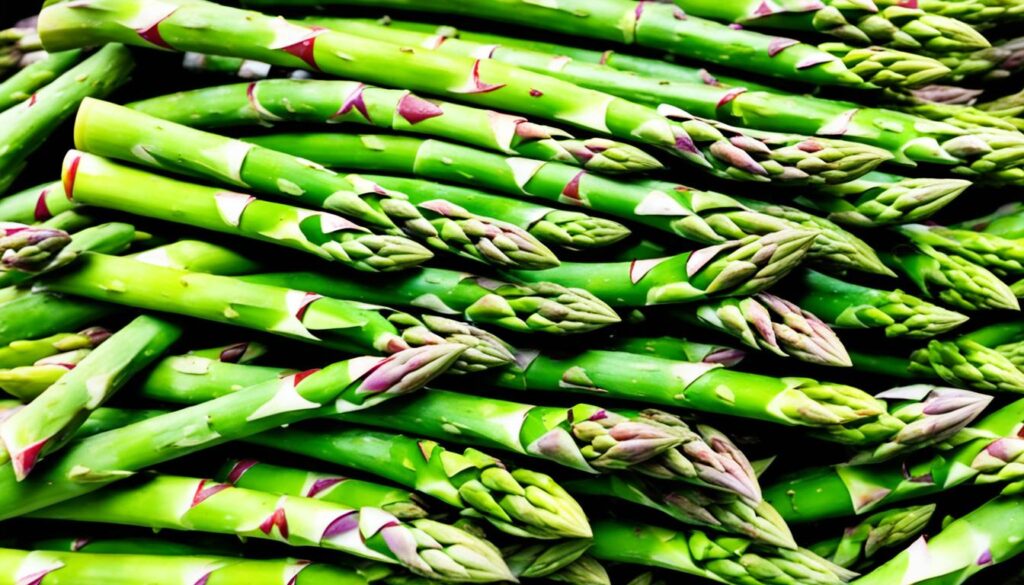Asparagus: A Healthy Addition to Your Dog’s Diet?

Asparagus is a popular vegetable known for its health benefits in humans, but can dogs also enjoy this nutritious green treat? Many pet owners wonder if it’s safe to share asparagus with their canine companions. In this article, we’ll explore the potential benefits and risks of feeding asparagus to dogs, as well as provide some alternatives to consider.
Key Takeaways:
- Asparagus is safe for dogs to eat and packed with vitamins, minerals, and fiber.
- Chop asparagus into small pieces to prevent choking and lightly cook it for easier digestion.
- Avoid using butter or cooking oil when preparing asparagus for dogs.
- Raw asparagus can be difficult for dogs to digest and may lead to gastrointestinal upset.
- Consult with your veterinarian before adding asparagus or other vegetables to your dog’s diet.
Is Asparagus Good for Dogs?
Asparagus can provide several health benefits for dogs. It is rich in calcium, zinc, iron, vitamin C, vitamin B, and vitamin K, making it a nutrient-packed addition to your furry friend’s diet. These essential nutrients play a crucial role in supporting your dog’s overall well-being.
Calcium: Asparagus contains calcium, which is essential for bone health and development. It helps maintain strong teeth and supports proper muscle function.
Zinc: Asparagus is a good source of zinc, which plays a vital role in immune system function, wound healing, and healthy skin and coat.
Iron: Iron is necessary for the production of red blood cells in dogs. Asparagus supplies iron, which helps carry oxygen to the organs and muscles, promoting energy and vitality.
Vitamin C: Asparagus is packed with vitamin C, a powerful antioxidant that helps fight off free radicals, boost the immune system, and support overall health.
Vitamin B: Asparagus contains various B-complex vitamins, including thiamin, riboflavin, niacin, and folate. These vitamins contribute to a healthy nervous system, improve metabolism, and aid in the production of energy.
Vitamin K: Asparagus provides vitamin K, which plays a crucial role in blood clotting and bone health. It helps maintain healthy blood vessels and supports proper blood circulation in dogs.
In addition to these essential nutrients, asparagus is low in calories and high in dietary fiber. This makes it an excellent choice for dogs on a weight management plan or those with digestive issues. The fiber in asparagus can help improve gut health, promote regular bowel movements, and alleviate constipation and diarrhea.
“Asparagus offers a wide range of nutrients that support your dog’s bone strength, immune system, organ health, coat condition, and overall vitality.”
Feeding your dog asparagus in moderation can be a healthy and nutritious addition to their diet. However, it’s important to note that some dogs may have difficulty digesting raw asparagus, leading to gastrointestinal upset. To make it easier for your dog to chew and digest, lightly cook the asparagus before serving. Remember to avoid using butter, oil, or seasonings, as these can be harmful to dogs.
To summarize, the benefits of including asparagus in your dog’s diet include:
- Rich in essential nutrients such as calcium, zinc, iron, vitamin C, vitamin B, and vitamin K
- Promotes bone health, immune system function, and organ health
- Provides antioxidants to fight free radicals and support overall health
- Low in calories and high in fiber, aiding in weight management and digestive health
Remember, as with any new food, it’s always advisable to consult your veterinarian before introducing asparagus or other vegetables into your dog’s diet. They can provide guidance based on your dog’s specific needs and health conditions.
Risks and Alternatives to Feeding Your Dog Asparagus
While asparagus is generally safe for dogs to eat, there are some risks and considerations to be aware of.
Risks of Feeding Asparagus to Dogs:
- Raw asparagus can be difficult for dogs to chew and digest, potentially causing choking.
- Gastrointestinal upset, including vomiting, stomach bloating, and diarrhea, can occur after consuming asparagus.
- Asparagus can lead to foul-smelling urine, although this is typically not an issue for housetrained dogs.
- It’s important to keep the asparagus fern, the inedible part of the plant, away from dogs as it is toxic to them.
Asparagus Alternatives for Dogs:
If you’re concerned about the risks associated with feeding your dog asparagus, there are alternative vegetables that can provide similar health benefits:
- Broccoli: Broccoli is packed with vitamins and minerals that are beneficial for dogs. It can be steamed or lightly cooked before serving.
- Green beans: Green beans are low in calories and high in fiber. Dogs can enjoy them cooked or raw as a tasty and nutritious snack.
- Cucumbers: Cucumbers are a hydrating and refreshing vegetable that dogs can safely eat. Just make sure to remove the seeds and peel before offering them.
If you decide to introduce any new vegetables to your dog’s diet, it’s always best to consult with your veterinarian to ensure it aligns with their specific health needs and dietary requirements.

Conclusion
Adding asparagus to your dog’s diet can be a healthy and nutritious choice. Asparagus is packed with vitamins, minerals, and fiber, which can contribute to your dog’s overall well-being. However, it’s important to approach feeding asparagus to your dog with caution.
Cooking the asparagus lightly and chopping it into small pieces can make it easier for your dog to chew and digest. This can help prevent any potential digestive issues that may arise from eating raw asparagus. It’s also crucial to avoid using butter, oil, or seasonings when preparing asparagus for your dog, as these additives can be harmful to their health.
Before incorporating asparagus or any other vegetables into your dog’s diet, it’s essential to consult with your veterinarian. They can provide guidance on whether asparagus is appropriate for your dog’s specific health needs and dietary requirements. Your veterinarian can also help you determine the right portion size and frequency of feeding asparagus.
Remember, while asparagus can offer numerous health benefits for your furry friend, it should be just a part of a balanced diet. Adding a variety of vegetables to your dog’s meals can provide them with the necessary nutrients and contribute to their overall well-being. So go ahead, explore new flavors and add some veggies to your dog’s bowl!
FAQ
Can dogs safely eat asparagus?
Yes, dogs can safely eat asparagus. It is a non-toxic vegetable that is packed with vitamins and minerals beneficial for their health.
What are the nutritional benefits of asparagus for dogs?
Asparagus is rich in vitamins (B-complex, A, C, K), minerals (potassium, zinc, iron), and fiber. It supports bone health, improves the immune system, promotes heart health, and provides a healthy coat and nervous system.
Can dogs eat raw asparagus?
It is recommended to lightly cook asparagus before feeding it to dogs. Raw asparagus can be tough to chew and digest, and it may pose a choking hazard. Cooking also makes it easier to chew.
Are there any risks or side effects of feeding asparagus to dogs?
Raw asparagus may cause gastrointestinal upset, including vomiting, bloating, and diarrhea in dogs. It can also lead to foul-smelling urine. Additionally, the asparagus fern, the inedible part of the plant, is toxic to dogs and should be kept away from them.
How should I prepare and serve asparagus to my dog?
It is best to chop asparagus into small pieces before serving to prevent choking. Lightly cook the asparagus without using butter or oil. Avoid adding any seasonings. Consult your veterinarian before adding asparagus or other vegetables to your dog’s diet.






